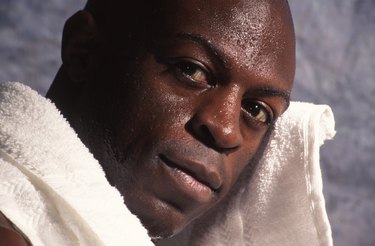
Salt, or sodium chloride, is the primary dietary source of sodium, an essential electrolyte mineral needed to maintain fluid balance within the body. Salt is 40 percent sodium by weight. As too much sodium in your diet can have negative health consequences, doctors advise against consuming more than about 1 tsp. of salt a day, according to MedlinePlus. However, people who sweat excessively, such as athletes, require a little more dietary salt than individuals who sweat less.
Sodium Needs and Sweating
Video of the Day
Most people do not need to ingest extra salt to replace sodium lost through sweat. The 1.5 g a day adequate intake for sodium is sufficient to meet the needs for sweat losses in adults ages 18 to 50 who follow a balanced diet and get recommended levels of physical activity, according to the Institute of Medicine. However, individuals with excessive sweating due to intense levels of physical activity or exercise in humid climates may require more than the AI. Daily sodium intake should not exceed the upper limit of 2.3 g a day, however.
Video of the Day
Salt Replacement in Atheletes
Individuals such as endurance athletes involved in lengthy and high-intensity exercise may benefit from consuming a little extra salt in their diets. Most exercise that makes you sweat doesn't necessitate salt replacement, according to The President's Council on Physical Fitness and Sports, as sweat is approximately 99 percent water and less than 1 percent electrolytes. However, during continuous activity of longer than two hours, especially in hot environments, a sports drink providing salt and another electrolyte, potassium, may be beneficial, notes the Council on Fitness.
Warning
The American diet is high in salt, and most people get more salt than they need. Consuming an excessive amount of sodium can result in high blood pressure, or hypertension, which is a risk factor for other serious health problems. You may not realize how much sodium you get in your diet, as 75 percent of America's sodium intake comes from salt added to processed foods by manufacturers, according to the American Heart Association. Tomato sauce, condiments, soups and canned foods are major sources of dietary sodium.
Water
The nutrient you most need to replace when you sweat is water. It is possible to lose up to several liters of sweat in an hour of physical activity, according to MedlinePlus, and these fluids need to be replaced to avoid dehydration. All adults, regardless of how active they are, require at least 3.7 liters, or 125 oz., of water a day, according to the Institute of Medicine. Drink plenty of water before, during and after exercise, even if you're not thirsty, cautions MedlinePlus. Clear urine, as opposed to yellow or dark urine, is a good indicator that you're adequately hydrated.